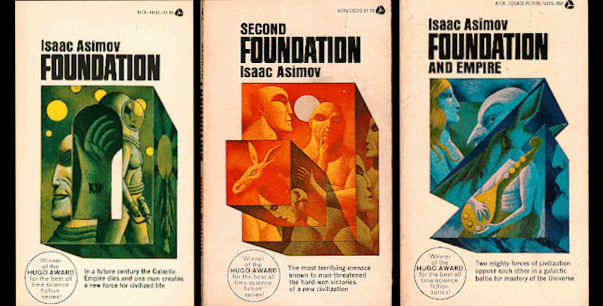Ike, Paul and Hari
I loved Isaac Asimov's Foundation trilogy when I read it as a teen. It had a scope you didn't often see in science fiction. Asimov decided to do something based on the rise and fall of a civilization, after all. Looking back, the overall story is done in a pretty haphazard fashion. It's a collection of shorter pieces written at separate times, and one can see Asimov pulling plot points out of nowhere to keep things moving.
I may have outgrown the series. I can't be sure since I haven't read it since, but I know I didn't like Asimov's post-trilogy Foundation books--though admittedly he wrote them decades later. In any case, good or bad, the central premise--that a guy named Hari Seldon develops "psychohistory" into a science, and can predict precisely what will happen, and what needs to happen, centuries into the future--is absurd. It's an exciting sf sort of idea, but in the real world it seems ridiculous that anyone could make useful predictions beyond the most general that go beyond a decade or so. (Not that they don't try, but history laughs at them, when it isn't horrified.)
Turns out Paul Krugman loved the trilogy, too. And why not--a world controlled to the nth degree by technocrats is right up his alley. Krugman apparently sees himself as a mini-Seldon, claiming to have predicted what's going on these days while others were way off. Good for him, except every pundit claims to have a great track record. So please Paul, make a list of ten very specific, anti-intuitive predictions that will come true in the next decade, and then we can judge. And if you're wrong, you've got your own foundation for a great science fiction series.


5 Comments:
i really wish Krugman argued for the other side
I liked the Foundation trilogy a lot as well. Asimov even spoke at my High School when I was there, which set me off on reading his works. But I hadn't read the robot works when I got to Foundation and Earth, which harkened back to the Robot stories, so I went back and read them and was a bit disappointed.
I never saw the films I Robot or Bicentennial Man, but have heard they were disappointing to Asimov fans. In the grand scheme of Sci Fi literature, I think Asimov deserves a lot of credit for laying the foundation (ha ha), but subsequent authors produced more noteworthy works (like Herbert, Card, and Pohl are my favorites).
I only read (actuallt listened while driving) to the Foundation trilogy in the last couple of years and while I enjoyed them immensely, I felt they were more about post-WW2 America than future-looking. The paranoia and the preoccupations seemed to come from that era.
After listening, I was disappointed to find that the great psychohistorian was Hari not Harry- I used to like the strangeness of weird spellings in scifi/fantasy now I find it offputting ( also reading some of Game of Thrones after watching the series)& I crave the familiar.
In my opinion, the original trilogy was much better than the sequels, which were written with the (silly) ambition of linking together Asimov's disparate SF series into one cohesive series.
I do think, however, that Asimov has only one real skill as a writer: devising grand ideas. He very rarely has memorable characters (although the girl in Second Foundation is an exception), or powerful emotional scenes, or anything of that sort. And even his plots are usually not much more than the gradual revelation of the amazing idea behind the story.
Foundation's psycho-historical predictions would be plausible if you granted his axiom that all human history results from the social force of millions of people, never from one single person. If that were true, it might someday be possible to predict the future of history.
But this axiom is absurd. See the quote from Paul Johnson near the top of this page for a great refutation of it.
To me it's not just that powerful individuals--whether its Napoleon, Hitler or the Mule--can change history. It's that even if all history were determined by the general movement of millions or billions, it simply requires far more knowledge and analytical power than anyone has to make useful predictions far into the future. Maybe it's like chaos theory. The slightest changes in a situation, changes likely no one is aware of, can make massive changes in the future (and even if you're aware of them, you don't know which will make the difference).
Post a Comment
<< Home